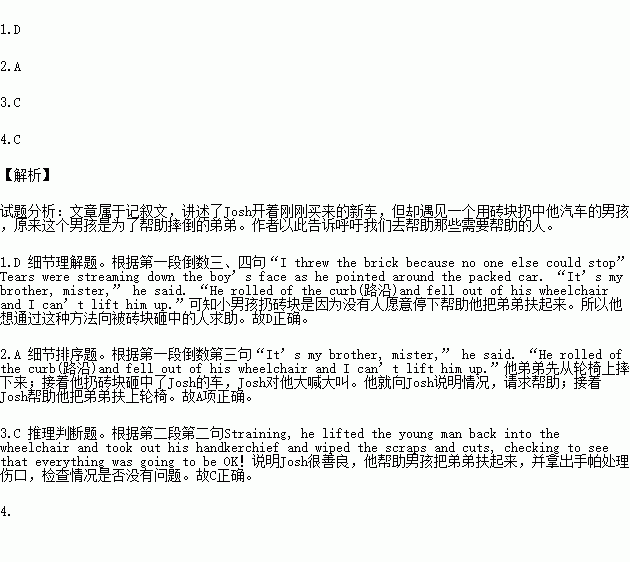题目内容
About ten year ago, a young and very successful businessman named Josh was traveling down a Chicago neighborhood street. He was going a bit too fast in his shiny, black, 12 cylinder Jaguar XKE, which was only two months old. He was watching for kids rushing out from between parked cars and slowed down when he thought he saw something. As his car passed, no child came out, but a brick sailed out and---WHUMP! ---It hit the Jag’s shiny black side door! SCREECH…immediately Josh stopped the car, jumped out, seized the kid and pushed him up against a parked car. He shouted at the kids, “What was that all about and who are you? Just what the heck are you doing?” Building up a head of steam, he went on. “That’s my new Jag, that brick you threw is going to cost you a lot of money. Why did you throw it?”“Please, mister, please…I’m sorry!I don’t know what else to do!” begged the youngster. “I threw the brick because no one else could stop” Tears were streaming down the boy’s face as he pointed around the packed car. “It’s my brother, mister,” he said. “He rolled of the curb(路沿)and fell out of his wheelchair and I can’t lift him up.” Sobbing, the boy asked the businessman. “Would you help me get him back into his wheelchair? He’s hurt and he’s too heavy for me.
Moved beyond words, the young businessman tried hard to swallow the rapidly swelling lump in his throat. Straining, he lifted the young man back into the wheelchair and took out his handkerchief and wiped the scraps and cuts, checking to see that everything was going to be OK!He then watched the younger brother push him down the sidewalk toward their home.
It was a long walk back to the black, shining, 12 cylinder Jaguar XKE—a long and slow walk. Josh never did fix the side door of his Jaguar. He kept the dent(凹痕)to remind him not to go through life so fast that someone has to throw a brick at him to get his attention. Feel for the bricks of life coming at you.
1.The boy threw a brick at the businessman’s car because _____.
A. the businessman drove his car at a high speed
B. he envied the brand-new car very much
C. he wanted to ask for some money
D. he wanted to turn to the businessman for help
2.Which of the following is the right order of the story?
a. The younger brother threw a brick at Josh’s car.
b. The elder brother fell out of his wheelchair
c. The younger brother begged Josh for help
d. Josh lifted the elder brother back into his wheelchair
e. Josh shouted at the younger
A. b, a, e, c, d B. a, c, d, b, e
C. b, a, c, e, d D. a, c, b, e ,d
3.What can we learn from the passage?
A. Josh would accept the money from the kids.
B. The two kids were Josh’s neighbors
C. Josh was a kind-hearted man.
D. Josh’s new car broke down easily.
4.According to the passage, the last sentence means____.
A. trying to get ready for the trouble in your future life
B. driving fast in the neighborhood street is dangerous
C. trying to be more understanding seeing others in trouble
D. protecting oneself from being hurt

